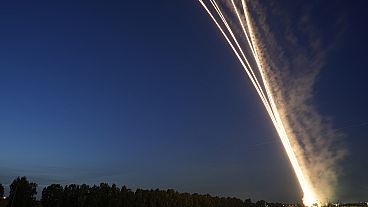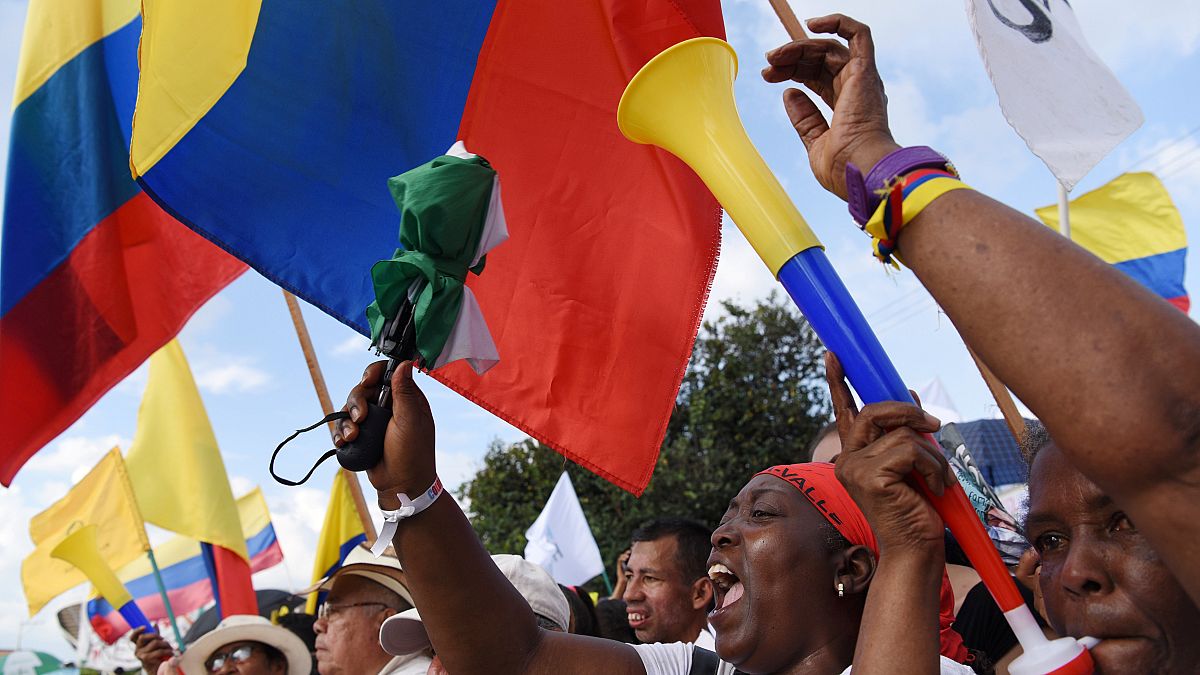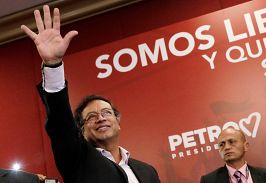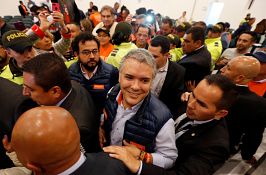Sunday’s vote is overshadowed by the fragile peace deal with the FARC rebel group, and by political and economic chaos in neighbouring Venezuela.
Colombians vote on Sunday to elect a new president with the country polarised over the peace deal struck in 2016 that ended 50 years of armed struggle by left-wing FARC rebels against the government.
Opinion polls suggest Sunday’s first round is likely to deliver a run-off (on June 17) between Gustavo Petro, the rising star of the left, and rightwing hardliner Ivan Duque.
The popularity of President Juan Manuel Santos has plunged from over 80 percent in 2010, to under 15 percent today. His main achievement is the fragile peace deal, whose survival could depend on the outcome.
The war spanning more than five decades killed more than a quarter of a million people, and displaced millions more.
Who are the candidates?
Once a supporter of the late Venezuelan president Hugo Chavez, the ex-guerilla and former mayor of Bogota, Gustavo Petro, has emerged as a major challenger to Colombia’s conservative elite.
Petro, a former member of the M-19 rebel group, is seen on the left as the only candidate capable of reaching the second round. Inspired by Latin America’s autocratic “caudillo” leaders, he has proposed policies such as the expropriation of large estates, and the replacement of oil revenues with those of avocado exports.
He has played down his previous role in the guerilla movement, but many see his rise as symbolic of Colombia’s transition from armed conflict to party-based democracy.
Election frontrunner Ivan Duque of the Democratic Centre has been leading in the polls for the past few months, with support put at between 35-41 percent. His coalition has the backing of former president Alvaro Uribe, the peace accord’s main critic.
Duque wants the terms of the agreement with the FARC revised: many in Colombia believe it was too weighted towards the former guerillas.
Sergio Fajardo from the centre-left Colombia Coalition is a former mayor of Medellin and state governor. The university professor is portrayed as a moderate.
German Vargas Lleras was Colombia’s vice-president under Juan Manuel Santos from 2014-17. Despite trying to distance himself from the country’s unpopular leader, his support has dropped.
Humberto de la Calle was the government’s chief negotiator in negotiations with the FARC that led to the peace deal, of which he is unsurprisingly a staunch defender. But his campaign has never got off the ground and support for the 72-year-old is put at under five percent.
What impact will the FARC peace accord have on the vote?
The peace agreement signed with the FARC rebels put an end to half a century of armed conflict, but its survival depends on who wins the elections. Colombian society is very much divided between its supporters and detractors.
“Ivan Duque of the Democratic Centre is on the extreme right of the ideological spectrum, supported by Christian parties, religious fanatics, and what he has said about reforming the peace process would in reality mean ending it, not implementing it,” political analyst Ariel Avila told Euronews.
“The problem is not the FARC taking up arms again. Rebel movements may grow but I don’t believe the FARC commanders will return. The big problem is that Colombia would be condemned to live in a new wave of violence,” he added.
In contrast, Gustavo Petro and the other three candidates say they will respect the agreement.
What are the other main issues?
Peace is a key issue given Colombia’s violent recent past. However, the campaign has been dominated by other matters which for many are just as important.
Security, health, education, the economy and the environment have all featured strongly. Inequality and political corruption are seen as factors that fueled the conflict, and still need to be confronted.
All candidates have vowed to tackle corruption and cronyism, although amid allegations on all sides voters may not take too seriously their resolutions to get tough.
How is the chaos in Venezuela affecting the vote?
Official figures suggest that more than 660,000 Venezuelans have crossed the border – some believe the real number is over a million – and are living precariously in Colombia, driven by the political and economic chaos in their homeland under the autocratic rule of President Nicolas Maduro.
According to a recent survey, just over 50 percent of Colombians fear that their country “may in the future be in the same situation as Venezuela”.
The charge from the “Uribistas”, the right wing Uribe-Duque camp, is that should their opponent Gustavo Petro win the election, Colombia will begin the rocky descent into becoming “a second Venezuela”.
Petro’s critics say he has been hesitant to distance himself from Chavez. In March his motorcade was attacked near the Venezuelan border and tensions have played into the election campaign.




